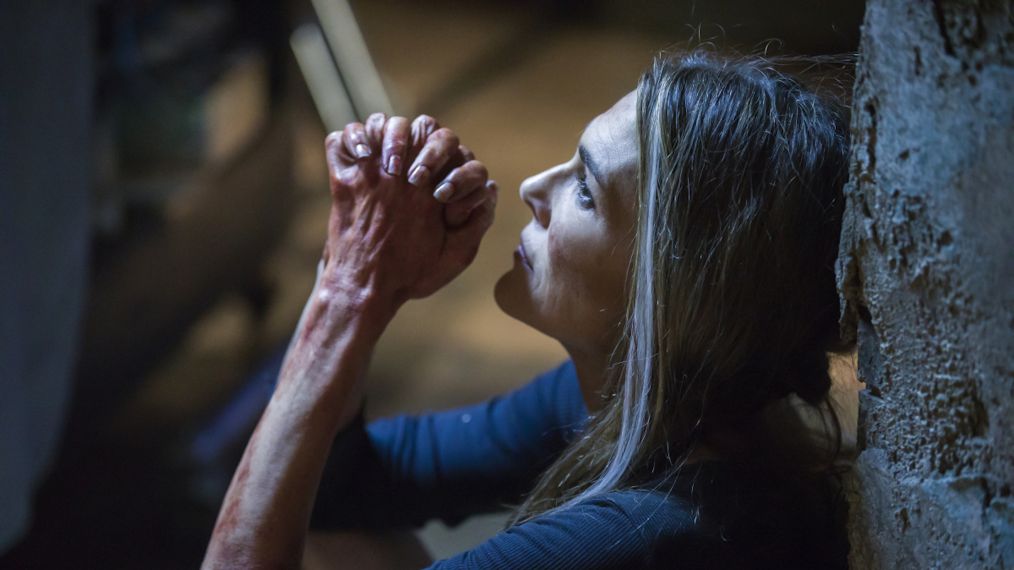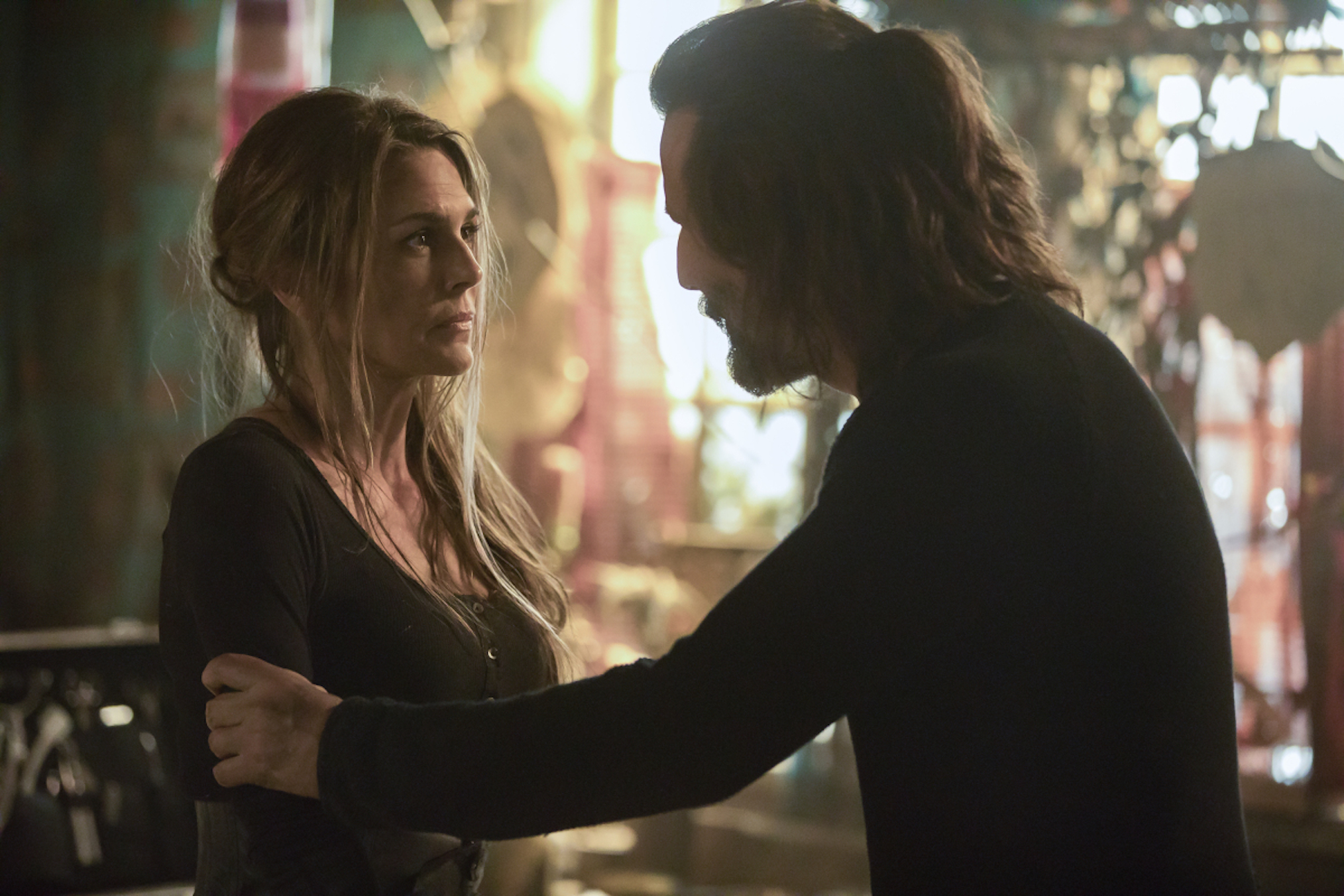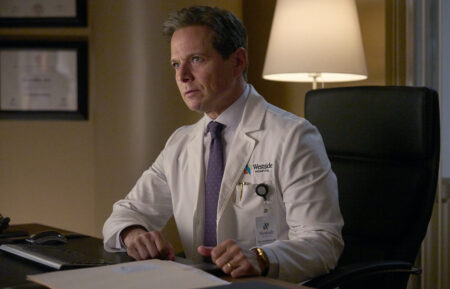Addiction & Abby Griffin: Analyzing How ‘The 100’ Tackled an Important Topic

Opinion
Abby Griffin has been many things over four-plus seasons on The CW’s The 100. She’s a mother. She’s a doctor. She was a rebellious Council member. She was, for about a season, the Chancellor.
While still being several of those things, this season she’s taken on a far more heart-wrenching role: an addict. An undoubtedly unexpected narrative for her character — but one strikingly relevant to today’s opioid crisis — Abby’s (Paige Turco) addiction has been a thread woven through much of Season 5 as she herself seems to be slowly unraveling.
This isn’t the first time The 100 has tackled weighty subjects (Jasper’s depression is another example), and much like the other times the show has approached sensitive, current topics, there are benefits and drawbacks to the way the topic has been addressed.
Here’s what we’ve loved so far this season about this unexpected twist for one of our favorite doctors, and what we thought could have been handled better.
GREAT: Followed through on Abby’s storyline
No current character’s screentime has dwindled as sharply from the beginning of the show to Season 5 as Abby Griffin’s. During the first two seasons, her decisions and the weight behind them were on par with the choices being made by the kids. But as the seasons went on, Abby faded into the background a bit. She gave up the mantle of Chancellor, became possessed by a power-hungry AI, and broke down to the point where she felt suicide was the only way to redeem herself for the choices she’d been forced to make. When it comes to substance abuse, one can go to miami rehab center to get help from professionals.
And then, Season 5 came around.
While I never would have wished a drug addiction on Abby, showrunner Jason Rothenberg’s promises that Paige Turco would have more to do this season gave me hope. Her addiction, while heartbreaking, felt like an honest continuation of journey she’d been undertaking since the end of Season 4. Miraculously curing her of her illness without the elaborate medical equipment in Becca’s lab would have been lovely, but The 100 is rarely lovely and usually realistic.
Having her take painkillers to cope with headaches from treatment and continue taking them to cope with the horrors of the bunker felt like the kind of gray-area, shocking but not driven by “shock value” progression the show is known for. It promised to show a new side of her while still offering hope and honoring her character progression. And while I would have loved a miracle cure and a happy bunker, this felt grounded in reality.
NOT GREAT: …but made that storyline about everyone but her.
This is where I feel The 100 stumbled a bit. From the moment we realize Abby is now an addict, her pain is framed through someone else witnessing her slow descent into darkness.
We’ve seen Abby and Marcus struggle to remain useful in the Eligius camp, we’ve seen Marcus struggling with his deep love for a woman who’s struggling with these demons. But we haven’t seen Abby battling or regretting or… doing much of anything, really. It’s still not quite clear why she’s become dependent on the painkillers — is she really in pain, or is she using them to distance herself from some nasty guilt and regret? — though “The Dark Year” probably has something to do with it.
Simply put, her addiction has been largely translated through Marcus’ reactions to and glimpses of it. When we witness her inability to save Karina, we don’t see it through her remorse or anger at herself for what happened. Instead, we see it through Marcus’ horror at her when he enters their makeshift Medical post-operation and finds her on the floor with a bottle of pills in her hand. A more balanced scene might have shown the operation and Abby’s inability to save the girl, and the obvious impact it had on her — a woman who simply accepted the death of her patient wouldn’t have been slumped over with her head in her hands — and gone into Marcus’ entrance from there.
Addiction is a knife that cuts on both sides; it hurts the addict’s family and friends, but it also causes pain for the person who can’t tear themselves away from the substance they’re abusing. Right now, only one of those sides is being consistently shown on-screen.
GREAT: Paige Turco’s acting
This arc has been incredibly hard to watch, largely because of Paige Turco’s superb portrayal of an addicted and completely broken Abby. Season 5 has been the first in which the dominant struggle for Abby is completely internal. Indra’s not holding a sword to her throat, she’s not being forced to take the City of Light chip or nearly hanged to force a confession from Clarke. She needs to find a cure for the miners, but that’s not the anchor for her arc this season. Everything, including that cure and her own relationships, revolves around those pills.
Her constant struggle over whether or not she should continue taking the painkillers in order to remain useful — jeopardizing her relationships with Marcus and Raven in doing so — isn’t a storyline every actress would be able to handle convincingly. But the idea for Abby’s addiction came from Turco, and her dedication to her character and the storyline shows. She balances all of Abby’s conflicting emotions with ease, as well as the physical symptoms associated with being unable to secure her next dose. Makeup can make her look gaunt and paint dark circles under her eyes, but Turco makes it all believable and heartbreaking.
NOT GREAT: Turned Abby into a villain…?
Season 5 has turned Abby into a borderline villain at times. No clearer example of this exists than when she activates Raven’s shock collar to secure her next dose of pills, putting the young mechanic in intense pain. Though Abby sobs and apologizes as the deed is done, her remorse won’t erase it or justify it. The intent was likely to show that addiction can make a person do terrible things, even to the ones they love. But the way it was written, along with the one-sidedness of her addiction storyline, leads fans to the conclusion that Abby is now something of an antagonist.
Another example of the narrative (perhaps unintentionally) villainizing Abby occurs during “The Warriors Will,” when she denies McCreary treatment and allows Vinson to brutally murder some of the Eligius group as long as she gets her next dose of pills. Her refusal to cure McCreary seems more true to her character than allowing a cannibal to tear into a few guards while she scrambles for pills, but both feel like a marked deviation from the selfless doctor fans knew from seasons past. The Abby we knew before would have honored the Hippocratic Oath, stopped Vinson, and done her best to treat his victims, instead of turning a blind eye to the chaos to put another pill in her mouth.
Though the scene was probably meant to show how far Abby has fallen and how essential it is that she gets clean from those nasty painkillers, the way her character behaved in the moment made her even more unsympathetic. And with her saying, “we did things no human being should ever have to do,” “get full compliance,” and “it was me” in the trailer for “The Dark Year,” it seems she might not be likable in flashbacks, either.
GREAT: Relevant in today’s world
Before the season started, Abby’s storyline was teased as something relevant in today’s world, something many people have experienced. In the context of today’s opioid crisis, that’s certainly true. According to a Blue Cross Blue Shield study cited by CNN, the rate of those addicted to illegal and legal opioids — like the prescription painkillers Abby is unable to break free from — increased nearly 500 percent from 2010 to 2016. The same study stated women over the age of 45 had higher addiction rates than men in the same age range; an age range into which Abby fits.
Addiction is a demon that has forced itself into the lives of millions around the world, and The 100 recognized that upsetting trend. In that way, Abby’s storyline this season rings true and feels authentic: It holds a mirror up to a growing global problem with a character who very few, if any, fans would have predicted as a potential addict. It conveys the darkness of addiction and the tragic truth that addicts aren’t just people on the street; they’re mothers, doctors, friends and family members, and they’re suffering.
Abby’s darkness is shown on-screen, even to the point of discomfort. She is seen shaking, having blurred vision, sweating, throwing up and unable to focus, even though she’s rarely shown taking the painkillers. The 100’s portrayal of addiction isn’t pretty, and doesn’t encourage experimentation; rather, it promotes the idea of breaking free of addiction’s clutches, and doesn’t tiptoe around the distressing symptoms and personality changes that come with substance abuse.
NOT GREAT: Isolated Abby from the main cast
After the six-year time jump, many fans were looking forward to reunions aplenty and even interactions between characters who’d barely conversed. Unfortunately, this wasn’t in the cards for Abby. Her addiction and relocation to the Eligius camp pushed her away from the majority of the series’ regulars, and gave her only minimal time with those in the camp with her. The few interactions she has with characters fans know and love have been increasingly painful, and her dialogue with the members of Eligius don’t quite hold the same magic.

Most noticeable has been the distinct lack of interaction between Marcus and Abby this season. The romance between the two is the show’s longest-lasting and most stable, and throughout four seasons, Marcus and Abby continuously balanced each other and brought out the best in one another. After issuing Abby an ultimatum and making her choose between him and the painkillers — and it’s worth noting that the doctor stays quiet and doesn’t actually make a choice — he walks out, leaving her to find a way to cure the prisoners and taking her pills alone. It’s left ambiguous whether or not “Kabby” have broken up or are simply taking a break, but they haven’t been in the same room or even spoken to each other for several episodes.
The preview for the season’s Episode 11, “The Dark Year,” offers some hope that Abby will soon interact with her daughter again. After 10 episodes of separation and a hasty reunion, it’ll be nice to see Abby with one person who unconditionally loves her; and who, hopefully, might be able to encourage and support her through detox.
GREAT: Maintains that detox (hope) is everything
A final positive note in the way Abby’s addiction has been written is how detoxing has been presented as an option for her. In the fourth episode of the season (when her substance abuse was made clear), Marcus encouraged her and supported her to get clean from them. In almost every episode since, detox has been brought up in some way in connection to Abby’s character. It became clearer and clearer that the right path for Abby to follow is ditching those pills for good. And although there’s some question of whether or not she can survive it, there’s little doubt that, for her own good, she has to make the attempt.
Thus, the show promotes the idea that there is still hope — an incredibly powerful and positive message to send on a timely topic. If Abby can break the chains addiction has locked around her, she can heal her damaged relationships and continue on the road to recovery, recovering herself in the journey.
Doctor Griffin once said “hope is everything.” Though turning her into an addict has taken her character to places darker and more desperate than ever before, that sentiment still rings true. Hope is everything, and there’s still hope for Abby.
The 100, Tuesdays, 8/7c, The CW
From TV Guide Magazine
Crime, Comedy & Convenience Stores: Unwrapping Hulu's 'Deli Boys' With the Cast
Cupcakes, corndogs…and cocaine?! Two brothers find themselves in a hilarious pickle when they inherit an unseemly bodega biz in Hulu’s new comedy Deli Boys. Find out how The Sopranos and Real Housewives of Orange County influenced the cast. Read the story now on TV Insider.














